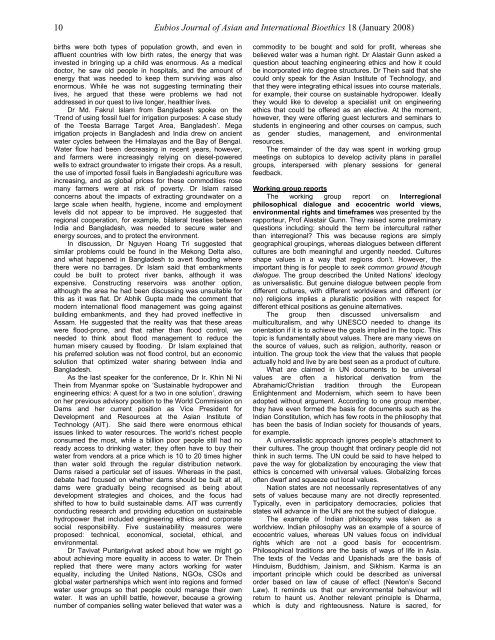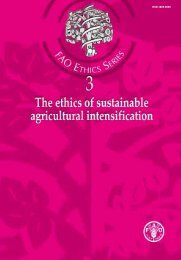Eubios Journal of Asian and International Bioethics EJAIB
Eubios Journal of Asian and International Bioethics EJAIB
Eubios Journal of Asian and International Bioethics EJAIB
- No tags were found...
You also want an ePaper? Increase the reach of your titles
YUMPU automatically turns print PDFs into web optimized ePapers that Google loves.
10<strong>Eubios</strong> <strong>Journal</strong> <strong>of</strong> <strong>Asian</strong> <strong>and</strong> <strong>International</strong> <strong>Bioethics</strong> 18 (January 2008)births were both types <strong>of</strong> population growth, <strong>and</strong> even inaffluent countries with low birth rates, the energy that wasinvested in bringing up a child was enormous. As a medicaldoctor, he saw old people in hospitals, <strong>and</strong> the amount <strong>of</strong>energy that was needed to keep them surviving was alsoenormous. While he was not suggesting terminating theirlives, he argued that these were problems we had notaddressed in our quest to live longer, healthier lives.Dr Md. Fakrul Islam from Bangladesh spoke on the‘Trend <strong>of</strong> using fossil fuel for irrigation purposes: A case study<strong>of</strong> the Teesta Barrage Target Area, Bangladesh’. Megairrigation projects in Bangladesh <strong>and</strong> India drew on ancientwater cycles between the Himalayas <strong>and</strong> the Bay <strong>of</strong> Bengal.Water flow had been decreasing in recent years, however,<strong>and</strong> farmers were increasingly relying on diesel-poweredwells to extract groundwater to irrigate their crops. As a result,the use <strong>of</strong> imported fossil fuels in Bangladeshi agriculture wasincreasing, <strong>and</strong> as global prices for these commodities rosemany farmers were at risk <strong>of</strong> poverty. Dr Islam raisedconcerns about the impacts <strong>of</strong> extracting groundwater on alarge scale when health, hygiene, income <strong>and</strong> employmentlevels did not appear to be improved. He suggested thatregional cooperation, for example, bilateral treaties betweenIndia <strong>and</strong> Bangladesh, was needed to secure water <strong>and</strong>energy sources, <strong>and</strong> to protect the environment.In discussion, Dr Nguyen Hoang Tri suggested thatsimilar problems could be found in the Mekong Delta also,<strong>and</strong> what happened in Bangladesh to avert flooding wherethere were no barrages. Dr Islam said that embankmentscould be built to protect river banks, although it wasexpensive. Constructing reservoirs was another option,although the area he had been discussing was unsuitable forthis as it was flat. Dr Abhik Gupta made the comment thatmodern international flood management was going againstbuilding embankments, <strong>and</strong> they had proved ineffective inAssam. He suggested that the reality was that these areaswere flood-prone, <strong>and</strong> that rather than flood control, weneeded to think about flood management to reduce thehuman misery caused by flooding. Dr Islam explained thathis preferred solution was not flood control, but an economicsolution that optimized water sharing between India <strong>and</strong>Bangladesh.As the last speaker for the conference, Dr Ir. Khin Ni NiThein from Myanmar spoke on ‘Sustainable hydropower <strong>and</strong>engineering ethics: A quest for a two in one solution’, drawingon her previous advisory position to the World Commission onDams <strong>and</strong> her current position as Vice President forDevelopment <strong>and</strong> Resources at the <strong>Asian</strong> Institute <strong>of</strong>Technology (AIT). She said there were enormous ethicalissues linked to water resources. The world’s richest peopleconsumed the most, while a billion poor people still had noready access to drinking water; they <strong>of</strong>ten have to buy theirwater from vendors at a price which is 10 to 20 times higherthan water sold through the regular distribution network.Dams raised a particular set <strong>of</strong> issues. Whereas in the past,debate had focused on whether dams should be built at all,dams were gradually being recognised as being aboutdevelopment strategies <strong>and</strong> choices, <strong>and</strong> the focus hadshifted to how to build sustainable dams. AIT was currentlyconducting research <strong>and</strong> providing education on sustainablehydropower that included engineering ethics <strong>and</strong> corporatesocial responsibility. Five sustainability measures wereproposed: technical, economical, societal, ethical, <strong>and</strong>environmental.Dr Tavivat Puntarigvivat asked about how we might goabout achieving more equality in access to water. Dr Theinreplied that there were many actors working for waterequality, including the United Nations, NGOs, CSOs <strong>and</strong>global water partnerships which went into regions <strong>and</strong> formedwater user groups so that people could manage their ownwater. It was an uphill battle, however, because a growingnumber <strong>of</strong> companies selling water believed that water was acommodity to be bought <strong>and</strong> sold for pr<strong>of</strong>it, whereas shebelieved water was a human right. Dr Alastair Gunn asked aquestion about teaching engineering ethics <strong>and</strong> how it couldbe incorporated into degree structures. Dr Thein said that shecould only speak for the <strong>Asian</strong> Institute <strong>of</strong> Technology, <strong>and</strong>that they were integrating ethical issues into course materials,for example, their course on sustainable hydropower. Ideallythey would like to develop a specialist unit on engineeringethics that could be <strong>of</strong>fered as an elective. At the moment,however, they were <strong>of</strong>fering guest lecturers <strong>and</strong> seminars tostudents in engineering <strong>and</strong> other courses on campus, suchas gender studies, management, <strong>and</strong> environmentalresources.The remainder <strong>of</strong> the day was spent in working groupmeetings on subtopics to develop activity plans in parallelgroups, interspersed with plenary sessions for generalfeedback.Working group reportsThe working group report on Interregionalphilosophical dialogue <strong>and</strong> ecocentric world views,environmental rights <strong>and</strong> timeframes was presented by therapporteur, Pr<strong>of</strong> Alastair Gunn. They raised some preliminaryquestions including: should the term be intercultural ratherthan interregional? This was because regions are simplygeographical groupings, whereas dialogues between differentcultures are both meaningful <strong>and</strong> urgently needed. Culturesshape values in a way that regions don’t. However, theimportant thing is for people to seek common ground thoughdialogue. The group described the United Nations’ ideologyas universalistic. But genuine dialogue between people fromdifferent cultures, with different worldviews <strong>and</strong> different (orno) religions implies a pluralistic position with respect fordifferent ethical positions as genuine alternatives.The group then discussed universalism <strong>and</strong>multiculturalism, <strong>and</strong> why UNESCO needed to change itsorientation if it is to achieve the goals implied in the topic. Thistopic is fundamentally about values. There are many views onthe source <strong>of</strong> values, such as religion, authority, reason orintuition. The group took the view that the values that peopleactually hold <strong>and</strong> live by are best seen as a product <strong>of</strong> culture.What are claimed in UN documents to be universalvalues are <strong>of</strong>ten a historical derivation from theAbrahamic/Christian tradition through the EuropeanEnlightenment <strong>and</strong> Modernism, which seem to have beenadopted without argument. According to one group member,they have even formed the basis for documents such as theIndian Constitution, which has few roots in the philosophy thathas been the basis <strong>of</strong> Indian society for thous<strong>and</strong>s <strong>of</strong> years,for example.A universalistic approach ignores people’s attachment totheir cultures. The group thought that ordinary people did notthink in such terms. The UN could be said to have helped topave the way for globalization by encouraging the view thatethics is concerned with universal values. Globalizing forces<strong>of</strong>ten dwarf <strong>and</strong> squeeze out local values.Nation states are not necessarily representatives <strong>of</strong> anysets <strong>of</strong> values because many are not directly represented.Typically, even in participatory democracies, policies thatstates will advance in the UN are not the subject <strong>of</strong> dialogue.The example <strong>of</strong> Indian philosophy was taken as aworldview. Indian philosophy was an example <strong>of</strong> a source <strong>of</strong>ecocentric values, whereas UN values focus on individualrights which are not a good basis for ecocentrism.Philosophical traditions are the basis <strong>of</strong> ways <strong>of</strong> life in Asia.The texts <strong>of</strong> the Vedas <strong>and</strong> Upanishads are the basis <strong>of</strong>Hinduism, Buddhism, Jainism, <strong>and</strong> Sikhism. Karma is animportant principle which could be described as universalorder based on law <strong>of</strong> cause <strong>of</strong> effect (Newton’s SecondLaw). It reminds us that our environmental behaviour willreturn to haunt us. Another relevant principle is Dharma,which is duty <strong>and</strong> righteousness. Nature is sacred, for
















